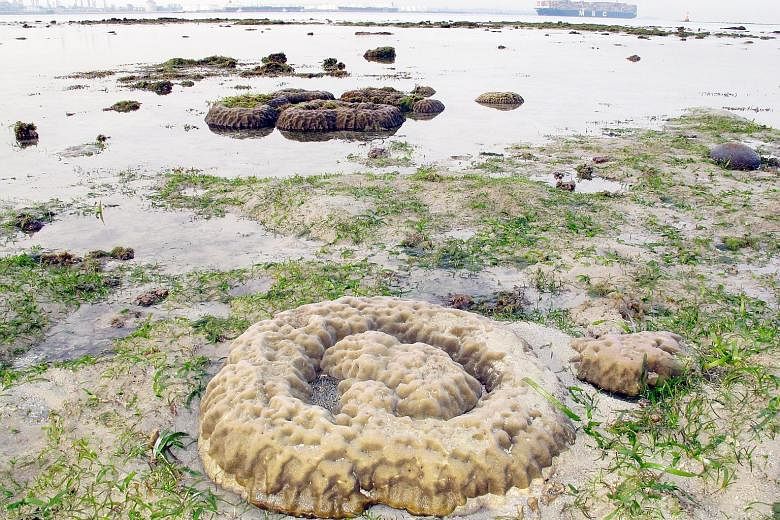Even though Singapore has lost over 60 per cent of its coral reefs through extensive land reclamation, its waters are still home to about a third of the world's hard coral species. But they could still be under threat - this time from warming seas as a result of climate change.
The National Parks Board (NParks) is ready to jump into action if sea surface temperatures creep up to a point that Singapore's corals are in danger of bleaching.
A coral safeguard programme targeting rarer coral species will be implemented, said Dr Karenne Tun, deputy director of the coastal and marine division at NParks' National Biodiversity Centre.
"We will collect fragments of these species from as many colonies as we can find, and grow them out in various reef areas as well as in aquaria, to ensure that we are able to maintain the population," she told The Straits Times. "We will also out-plant them back on the reefs after the bleaching event passes."
Meanwhile, NParks has initiated monitoring schemes to better understand how elevated sea surface temperatures may influence the photosynthetic responses of corals.
Coral reefs cover just 284,000 sq km of the ocean floor - about 0.1 per cent of the total ocean area - but they support a surprising amount of biodiversity. Around the world, these underwater palaces support about 30 per cent of all described marine species.
In Singapore waters, there are more than 250 species of hard corals. The total reef area here is an estimated 13.25 sq km.
But even as a global climate pact was forged in Paris last December, coral reefs worldwide are reeling from the impact of climate change.
Marine scientists say coral reefs are one of the habitats most under threat, due to the dual effects of ocean warming and ocean acidification. "Ocean warming is a direct impact of climate change that increases temperature stress on corals," said Dr Intan Suci Nurhati, a coral researcher from Singapore-MIT Alliance for Research and Technology.
When carbon dioxide dissolves in the ocean, carbonic acid is formed. The increasing acidity will lead to higher rates of erosion of the physical structure of reefs, said Assistant Professor Huang Danwei, a marine biologist from the National University of Singapore's (NUS) department of biological sciences. Current and projected rates of global warming mean many stony corals will expel the symbiotic microalgae living within them and nourishing them, Prof Huang added. But expelling the algae causes coral bleaching.
In October last year, science journal Nature reported widespread coral bleaching. This caused the United States National Oceanic and Atmospheric Administration to officially declare a global bleaching event on Oct 8, the third in recorded history, after 1998 and 2010.
These were El Nino years, referring to the phenomenon linked to prolonged warmer weather that is expected to continue this year as well, with scientists warning of bleaching events. In 1998, about 25 per cent of corals here died, while 5 per cent of them did so in 2010.
Prof Huang, who runs the Reef Ecology Lab at NUS, said coral reefs can protect shorelines and support recreation and tourism.
"The dive trail at the Sisters' Islands Marine Park attests to that. We have many more coral reefs that have the potential to become world-class dive sites, right in our backyard."
SEE SCIENCE


